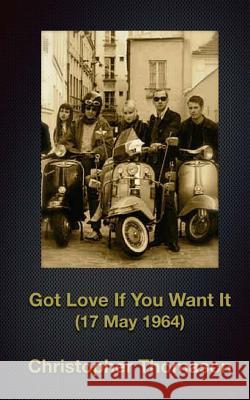Got Love If You Want It: 17 May 1964 » książka
Got Love If You Want It: 17 May 1964
ISBN-13: 9781497355224 / Angielski / Miękka / 2014 / 156 str.
May Bank Holiday, 1964. History records this as a weekend of mindless mayhem as Mods and Rockers fought on the beaches of various south coast towns. This is the story of one small group of them. Save it isn't really a story about fighting, though there is some. And whilst the lead players are fashion-conscious teenage hedonists - wrapped up in themselves, their music, their dancing and their reputation in the Mod world - that doesn't define what kind of people they are, their virtue. Jimmy is going down to Brighton with some friends from South London. It's a simple enough trip. A chance to look good, meet lots of other good-looking people and have fun. But for him it is destined to be a philosophical journey. An exploration of his character; of his ability to do the right thing by the right people. Why? For two reasons. First, at its centre this is a story about a very particular and troublesome love: that which Jimmy holds for Penny, his best friend's girl. Which makes it an ethically challenging love. One that forces him to ask and answer a number of difficult questions about fate, loyalty and justice. Meaning that as much as the book provides an accurate and acute insight into the interests and obsessions of the time, it also explores how the young of the day thought. How they saw their futures. How they justified their present. And how they reconciled their free - and somewhat selfish - lives with those of their parents. The second reason only becomes clear in the penultimate chapter, although the story becomes strangely unsettling before then. Why, we start to ask, is everything seen from Jimmy's side. And why does he resemble a failing hero in a Greek tragedy. Have we missed or underestimated something? Has the bump on the head he suffered confused us as much as him? This is a poignant insight into growing up during a particular moment in English history. Full of wonderful music and thoughtful dialogue, it is at times funny, at times sad, sometimes quite cruel. It is also a philosophical tale. One made all the more powerful by the trick it plays with our sense of perspective. At the end of the book a full Notes section explains the various literary and cultural references around which the story is told, as well as the relevance and history of the key locations mentioned in Brighton and London. About the author. Christopher Thomason is an historian of philosophy, culture and ideas. He was educated at Chislehurst & Sidcup Grammar School and University College London.
Zawartość książki może nie spełniać oczekiwań – reklamacje nie obejmują treści, która mogła nie być redakcyjnie ani merytorycznie opracowana.











